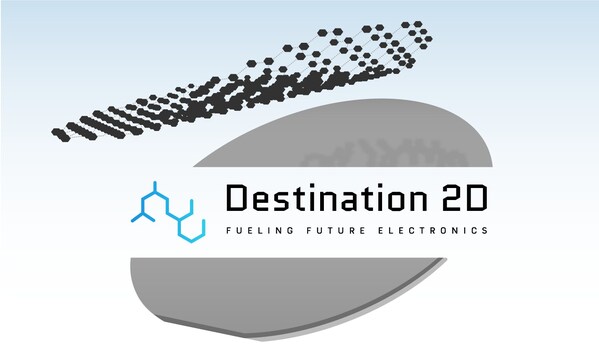 2024-12-10
2024-12-10
 Destination 2D Inc.
HaiPress
Destination 2D Inc.
HaiPress

MILPITAS,Calif.,Dec. 6,2024 -- Destination 2D™ - a new semiconductor startup with unmatched expertise in graphene process technology - today announced it has successfully achieved wafer-scale synthesis of high-quality graphene within CMOS-compatible process conditions.
In doing so,the company is enabling the use of graphene as the first-ever two-dimensional material in mainstream semiconductor products through immediate availability of the first 300mm scale graphene synthesis equipment - the CoolC GT300™.
Destination 2D was co-founded by Ravi Iyengar (CEO),a semiconductor microprocessor design veteran turned serial entrepreneur,and Prof. Dr. Kaustav Banerjee (CTO) – a UC Santa Barbara electrical engineering professor and the pioneer behind the company's unique and patented graphene interconnect technology.
The issues facing the semiconductor industry as they relate to interconnects are profoundly impacted by the ever-shrinking dimensions of regular process technology. The standard interconnect material,copper,has been used for the past 30 years and is now reaching commercial end-of-life due to the ruthless tyranny of Moore's Law and electron migration that renders copper extremely problematic in low geometry fabrication.
At sub-15 nm interconnect dimensions,the resistivity of copper increases rapidly - causing significant degradation in both circuit and system-level performance,power,and dramatically impacting all reliability metrics required by modern semiconductor designs in products such as GPUs,CPUs and others.
Graphene is a carbon allotrope consisting of a single layer of carbon atoms arranged in a hexagonal planar and atomically-thin - i.e. 2D - nanostructure. The name "graphene" is derived from "graphite" and the suffix -ene,indicates the presence of double bonds within the carbon structure. Graphene is known for its exceptionally high tensile strength,electrical conductivity,and for being the thinnest 2D material in the world. On a microscopic scale,graphene is the strongest material ever measured – it is far stronger than steel.
The existence of graphene was first theorized in 1947 by Philip R. Wallace during his research on graphite's electronic properties. In 2004,the material was isolated and characterized by Sir Dr. Andre Geim and Sir Dr. Konstantin Novoselov,both at the University of Manchester using a piece of graphite and adhesive tape.
In 2010,Novoselov (now Destination 2D's Chief Scientist) and Geim were jointly-awarded the Nobel Prize in Physics for their "groundbreaking experiments regarding the two-dimensional material graphene."
While tiny flakes of graphene are easy to produce,attempts to scale the manufacturing process for integration into mainstream CMOS have had negligible success due to fab-compatibility issues and quality control concerns.
Large area graphene synthesis,typically involving chemical vapor deposition (CVD) based techniques,require high temperatures that far exceed the allowed thermal budget of CMOS interconnect fabrication,and also require a mechanical "transfer" of the graphene grown over a metallic substrate to dielectric substrates.
Moreover,pristine (monolayer) graphene is a semimetal with a low charge carrier density,resulting in high sheet resistance,which further limits its direct applicability to interconnect applications. Therefore,for interconnect applications,multiple layers of edge-contacted graphene along with suitable "intercalation-doping" is required.
This was first theorized and experimentally demonstrated by Destination 2D's CTO and his team,who subsequently pioneered the pressure-assisted solid-phase diffusion technique for synthesizing multilayered graphene directly over dielectric substrates at CMOS-compatible temperatures.
The company's unmatched expertise in harnessing graphene's unique capabilities for chip interconnects is further bolstered by an equipment engineering team led by Chief Product Officer Dave Silvetti,an award-winning semiconductor equipment industry veteran. Silvetti is credited with bringing several cutting-edge CMOS process technology equipment designs into high-volume production.
Destination 2D's CMOS-compatible interconnect design innovation is achieved via intercalation-doped and edge-contacted multi-layer graphene,which delivers lower resistivity,significantly better reliability and up to 80% higher energy-efficiency than copper interconnects.
A CMOS-compatible synthesis technology allows for the direct synthesis of graphene onto wafer-scale dielectric substrates at temperatures significantly below the CMOS thermal budget. All of this is achieved without the warping and cracking issues that have plagued previous graphene commercialization efforts around CMOS interconnects.
Armed with several key patents,these design and process technology inventions are just one aspect of Destination 2D's breakthrough innovation. The other equally crucial component is the CoolC GT300,a specialized,industrial-scale patented equipment developed by Destination 2D.
The CoolC GT300 implements Destination 2D's proprietary graphene synthesis process without the traditional thermal issues that have prevented graphene from being in CMOS applications. Simultaneous with Destination 2D's achievement of the wafer-scale graphene synthesis technology,this patented equipment is announced with immediate availability for order to interested customers.
"Wafer-scale graphene coverage demonstrated by Destination 2D using BEOL compatible low-temperature transfer-free process marks a significant milestone for the CMOS industry," said Ravi Iyengar,CEO of Destination 2D. "Destination 2D's interconnect technology - when integrated in both Logic and Memory chips - could profoundly transform the landscape for Artificial Intelligence and other compute-centric applications."
About Destination 2D:
Destination 2D is a groundbreaking startup that has commercialized integration of graphene interconnects into standard CMOS semiconductor process technology at scale and without the traditional issues that have prevented graphene from being used in chip manufacturing processes to date.
Graphene has exceptional electronic conductivity that is far superior to the standard copper interconnects used for the past 30 years and which is now reaching commercial end-of-life. Graphene also possesses high mechanical flexibility and strength,as well as exceptional physical and chemical stability. Thanks to the pioneering efforts of a world-renowned team,Destination 2D is uniquely poised to bring graphene into the mainstream of semiconductor manufacturing. Learn more at www.destination2d.com.
Destination 2D and CoolC GT300 are trademarks of Destination 2D,Inc. All other referenced trademarks and registered trademarks previously cited are hereby recognized and acknowledged.
Please contact Destination 2D press counsel Jonathan Hirshon for more information